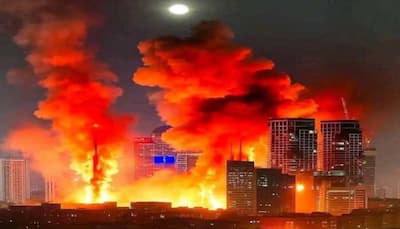New Delhi: Iran launched a massive retaliatory operation early Friday under the codename True Promise III, striking deep inside Israel and causing widespread destruction, particularly in Tel Aviv and other major cities. The operation followed targeted Israeli attacks that claimed the lives of senior Iranian military commanders and nuclear scientists.
The Iranian strikes began at approximately 1:30 a.m. Iran time, marking the third phase of the operation – which had already hit several strategic Israeli positions in earlier phases. The elite Islamic Revolution Guards Corps (IRGC) confirmed the operation less than 24 hours after what Iranian officials described as a “series of aggressive assassinations” by Israel on Iranian soil, including in the capital, Tehran.
According to Israeli and Iranian media, dozens of missiles were launched toward multiple Israeli cities that include Tel Aviv, Jerusalem (al-Quds), Haifa, Beersheba, Lake Tiberias, Safed and parts of the Western and Central Galilee.
Tel Aviv witnessed the most devastating impact of the Iranian strikes. A missile struck a 50-story building there, causing massive explosion and sending columns of smoke billowing into the air. Israeli Channel 13 described the aftermath as “unprecedented destruction”, with widespread fires, building collapses and civilian injuries.
At least nine buildings were reportedly destroyed In Ramat Gan, while hundreds of others suffered damages. Fires broke out across multiple sites in the Greater Tel Aviv metropolitan area, including Jaffa and Dan Tel Aviv, where emergency crews responded to people trapped in multi-story structures.
Israeli Army Radio and Israel Hayom reported a significant number of casualties, although official figures were withheld under a censorship order from Israel’s Home Front Command. Authorities prohibited photography and video recording in targeted areas, urging settlers not to document the destruction – citing the risk of aiding “the enemy”.
Reportedly originated from Israeli sources, videos circulating on social media showed Iranian ballistic missiles bypassing multiple Israeli defense systems. The IRGC’s Aerospace Division is believed to have executed the missile operation and struck dozens of Israeli airbases and military installations.
Former interior minister under President Ebrahim Raeisi, Brigadier General Ahmad Vahidi confirmed that at least 150 targets were hit, including a nuclear research facility and the Israeli Ministry of Military Affairs.
Reports also claimed that two Israeli F-35 fighter jets and several drones were downed by Iranian air defense systems. Tehran claims to have one lady fighter pilot alive.
Director of the Center for Strategic Studies and International Relations Amir Al-Mousawi stated that one of the missiles struck a critical nuclear research center in Tel Aviv.
The Iranian response followed a series of Israeli strikes that killed top officials in Iran’s military and nuclear establishment. Among the high-ranking officials killed were Iran’s Armed Forces Chief of Staff Major General Mohammad Bagheri, IRGC former Commander-in-Chief Major General Hossein Salami, head of the IRGC Aerospace Division Brigadier General Amir Ali Hajizadeh and Khatam al-Anbiya Central HQ Commander Major General Gholam-Ali Rashid.
The strikes also claimed the lives of veteran nuclear scientists Dr. Mohammad Mehdi Tehranchi, Dr. Fereydoun Abbasi and Dr. Abdol-Hamid Minoucher.
In addition, more than 70 civilians, including women and children, were killed in the Israeli strikes, according to Iranian media.
The Iranian operation began just minutes after Ayatollah Seyyed Ali Khamenei addressed the nation in a televised message. In his speech, he declared that the Israeli regime had made a “big mistake” and would be rendered “helpless”.
“Our armed forces are ready, and the people of Iran stand united,” he said, adding that the Iranian response would be “decisive” and “based on the blood of the martyrs”.
The IRGC, in an official statement, described True Promise III as “crushing and precise”, carried out under the code name Ya Ali ibn Abi Talib to coincide with the religious occasion of Eid al-Ghadir. The statement emphasised that the operation had the full backing of Iran’s political leadership and people and was executed with the aim of deterring further aggression from the Israeli regime.
Israeli Prime Minister Benjamin Netanyahu reportedly held an emergency security meeting in an underground compound as missiles continued to fall across Israeli territories. Sirens remained active in many cities, and the Home Front Command urged civilians to stay near their shelters – signaling concerns of further escalation.
Brigadier General Vahidi said that Operation True Promise III would continue “as long as necessary”, highlighting Iran’s commitment to retaliate for what it described as “aggression against its skies” and “bloodshed of its martyrs”.
While Israeli authorities have yet to release official casualty figures, independent reports suggest extensive damage to infrastructure and significant loss of life. Iran has indicated that further details of the operation will be released in due course.
The situation remains tense as both sides brace for potential further escalations in the coming hours and days.
Stay informed on all the , real-time updates, and follow all the important headlines in and on Zee News.








